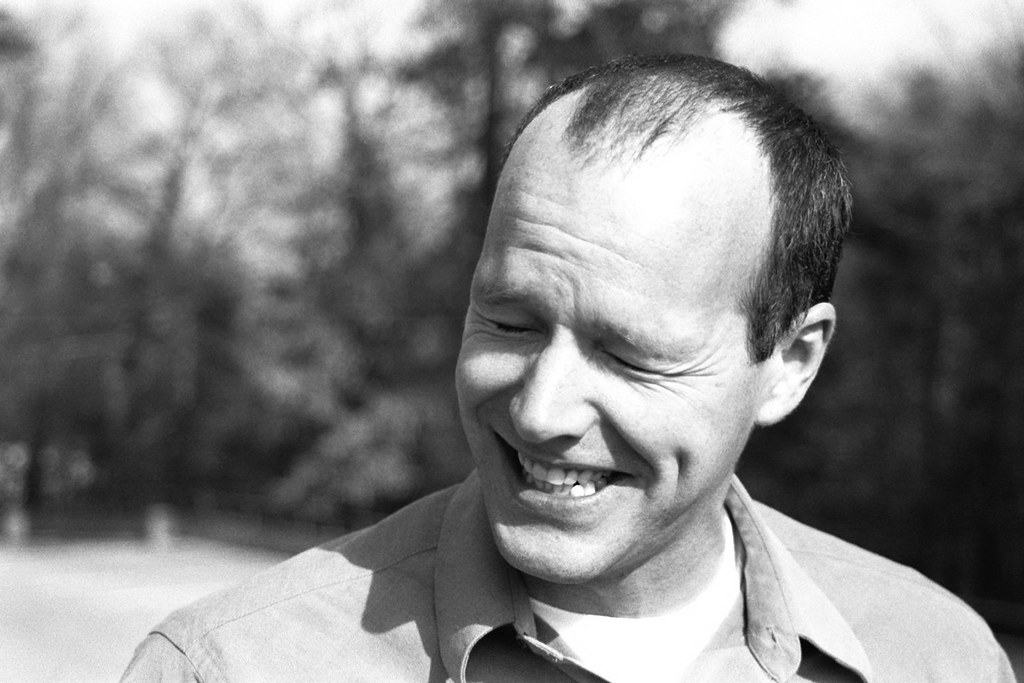Last Eve with Evie
Evie Shockley has been my North Carolina poet friend for longer than anyone else here, and she's a great one, and I'm lucky to have a lot of great ones here. We met in the spring of 2002, a few months before the Desert City began. So seeing her read last night and holding her book in my hands, it was like watching a family member get well deserved success. And to top it off -- Evie smoked it. She read with a confidence that was compelling -- here was an artist communing with their work, making a third thing from the dyad of writer and artifact.
An excellent after party hosted by Leigh & Tony Tost in their sweet little house on Duke street (complete with a pair of rockers on the porch (plus a couple of nice chairs to sit in.)) Tony's got a study I immediately started to covet. He's also got several pairs of hand weights (dumb bells) in the corner. Is the Tost beefing up for a rematch with the reigning king of all competitive physical contests? (meaning me.) He may write better poems, publish more books, leave a larger mark on the history of literature, have less BO, and lack my hideous growths -- but goddammit, I'll put his wrist on the table or pop an eyeball trying.
Talking, eating cheesecake with our bare hands, singing along to The Magnetic Fields and Randy Newman (don't want to hurt no kangaroos), we ended the evening with a round robin reading by David Need, Tony, Brad, Tim Earley, and myself. What a wealth of poetry -- woke up with lines in my head miles long.
Sweet, sweet. So the 2006/2007 Desert City schedule will be coming out soon; the start's been slow around here, but we've got some good stuff in the works.
Here are my intros for Evie and Linda:
Evie Shockley & Linda Pennisi Intro
1. Announcements
a. Reception & Booksigning after the reading
b. After Party at the home of Leigh & Tony Tost.
2. Linda Pennisi writes, “Soon they were having coffee / and she was telling him about the guy / who kept brining her down. / No matter how hard she tried, she couldn’t / get away for good.” And stories like this – of a woman trapped in an abusive relationship or a girl abducted from the woods and, on the surface, less traumatic events like playing Mary in a church nativity play – these stories form the backbone of many of the poems in her latest collection, Suddenly, Fruit.
3. The ribcage of these poems, however, is illustrated by the title of the poem I just quoted: “Persephone Meets Christ.”
4. So, along with threads of domesticity, art, faith, sex, and age, the myth of Persephone embroiders these poems as in “Form,” a poem about watching a poetry reading, “Tonight / Persephone is the forsythia. / She comes in yellow bursts / from tongue-tip and fingertip; / a million pores zing open / to birth a star-blossom each.”
5. Pennisi writes, in these poems, the gaps between the sentences in the myths; she writes the story that lies between the period and the following capital letter, and we can see that our lives are myths and the myths are our lives.
6. William Pitt Root writes of Suddenly, Fruit, “[it has an] attentive languor and a spell of authenticity that is intoxicating and sobering in the same draught. [It is] an impassioned elixir.”
7. Please welcome Linda Tomol Pennisi.
8. It’s hard to resist reading you the entirety of Evie Shockley’s opening poem from her new book, half-red sea; it’s a poem the grabs your coat’s lapels and pulls you in fast, close, and rough; the book doesn’t let go until it’s closed. I’ll quote just a few lines, though, from “possibilities of poetry, upon her death”: “ars poetica, rough ship, drag / me from world to brutal word, / mental passage. (write.) be / a wail of a sound, surfacing / to fountain dark water found / in valleys of the shadow of breath.”
9. And these poems breath in and with the rarified air of such greats as Gwendolyn Brooks, Miles Davis, Billie Holiday, Phyllis Wheatley, and the mysterious woman “e” about whom Evie writes, “I am named for a poet who never in her lifetime / published…her / poems read like grocery lists. I need—a dozen eggs / --a tub of lard—loaf bread—fatback—and rat poison / for the rat who sleeps in my bed.”
10. And as Shockley’s poems work around and within this framework of her literal and figurative ancestors, her poems enact hallucinatory forms like the way a grocery list can become a death threat.
11. In her poem “A Thousand Words”, the word “torture” forms a frame around words that make up the subtext of the current administration: “torture shower camp station ghetto inner city tenement project projectile target practice black brown beige torture.”
12. Sonnets spice the mix but sonnets turned from their European roots to the service of the ones who were once enslaved. As in “blue-ing green: the sonobiography of miles davis”, she writes “blue flame the first thing he knew :: / st. louis blues with dizzying rules :: / blue devil makes his pointed debut”
13. And then a sales pitch that sounds startlingly possible: “martin luther king, jr. day / getaways! // need a tan? try our white flights! / ride first-class on a one-way ticket out / of the city!”
14. Along with these sharp social critiques, encomia for the ancestors, and whip-smart satires, half-red sea presents “simple”, and lovely, love poems.
15. In “apples and oranges: an allegory,” Shockley writes, “so I’m on the lookout for a good apple, okay, / a really good one, / a you-ain’t-had-no-apple-like-this apple. // and find myself with an orange. // now it’s not what you’re thinking…. I had not given up all hope of ever putting my hands / on a good apple / some of my friends had damn good apples … I’m still an apple person, myself / an apple person who knows that // all oranges are not alike. / there’s some / like apples.”
16. Please welcome my dear friend Evie Shockley.



0 Comments:
Post a Comment
<< Home